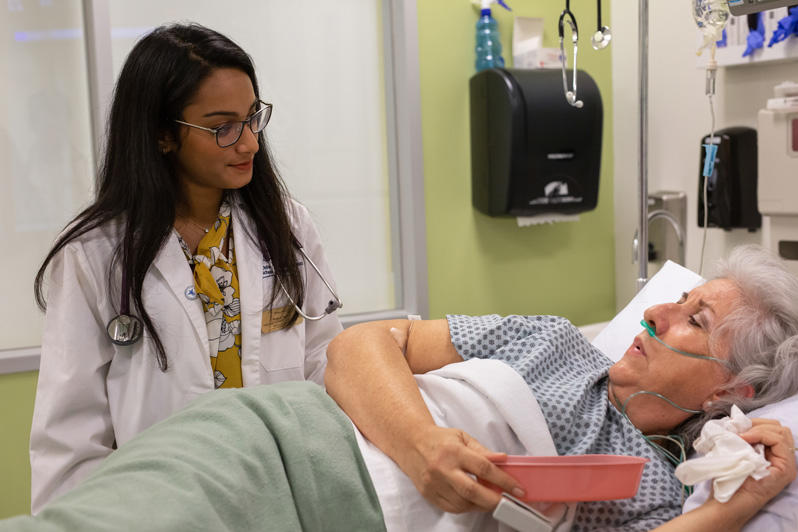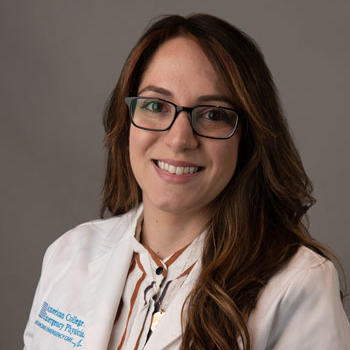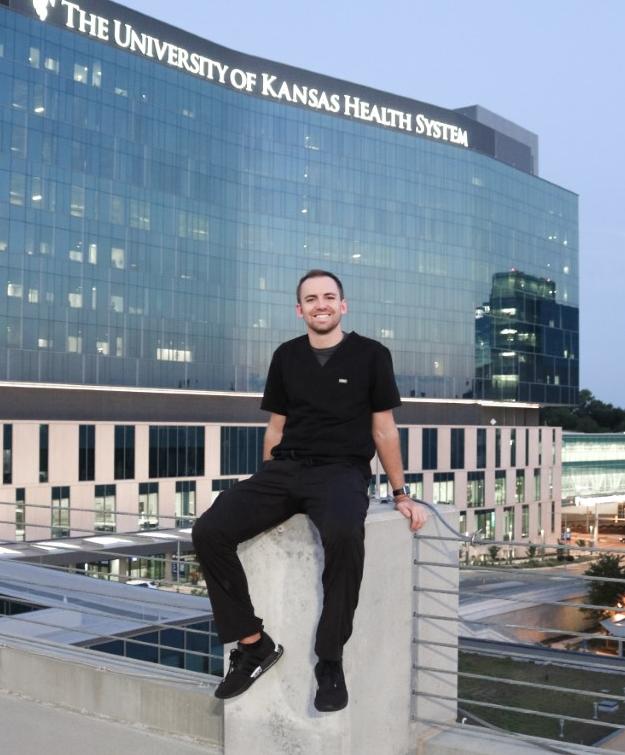An emergency room visit can be unpredictable. Some of the visits turn out to be fairly benign. But others may involve major trauma, heart attack, stroke, or other life-threatening illness. Patients who walk into the emergency room can be of any age, background and medical history.
Quickly getting emergency room patients the care they need—and often saving their lives—is the job of the emergency medicine physician. If you have ever visited an emergency room, you may have first-hand experience with an emergency room doctor. If not, you have probably at least seen one portrayed on television.
Emergency medicine may seem like an exciting and challenging specialty. But how do you become an emergency room doctor? This article will describe what an emergency room doctor does and explain the steps required to become an emergency medicine physician. It will also discuss what to expect from a career in emergency medicine.
WHAT DOES AN EMERGENCY DOCTOR DO?
Emergency medicine is the medical specialty that involves the diagnosis and treatment of unforeseen injury or illness. In practice, an emergency medicine physician specializes in taking quick action and making split-second decisions.
Many emergency doctors work in the emergency unit of a hospital or other facility, commonly referred to as the emergency room. The emergency room doctor communicates with emergency medical technicians (EMT’s), firefighters, and police to prepare for incoming patients. The emergency doctor also works with nurses, clerks, social workers, and other staff to intake these and other visitors.
The emergency doctor’s first order of business is to assess incoming patients. Severely injured or ill patients may be uncommunicative or even unconscious, and the emergency medicine physician often has to make decisions based on limited information. The emergency doctor may order tests to get further clues, but an immediate priority is often triage—sorting out the patients most in need of immediate care.
Once a patient’s condition has been assessed, the emergency doctor must determine a further course of action. Some patients may be treated in the emergency room and released. Others may require referral to another specialist for follow-up care. The most serious cases may require resuscitation or stabilization. They may be admitted to the hospital for treatment or even rushed into surgery.
Many medical specialists see patients one at a time. An emergency doctor, however, must generally coordinate the treatment of several patients at once. All of this might be interrupted at a moment’s notice by the arrival of an ambulance or a mother going into labor.
HOW TO BECOME AN EMERGENCY PHYSICIAN
To be an emergency doctor, you must first become a physician by graduating from an accredited medical school—such as American University of the Caribbean School of Medicine* (AUC). The path to a medical degree at AUC, which is located on the Caribbean island of St. Maarten, is the same as at United States-based schools: two years of medical science classes and two years of hands-on clinical training. For AUC students, the medical sciences curriculum is completed at the St. Maarten campus; the clinical training can be completed at affiliated teaching hospitals in the United States or in the United Kingdom.
AUC also partners with the University of Central Lancashire (UCLan) in the United Kingdom for a “UK-track” option. The first two years at UCLan focus on studying the medical sciences. Upon completion, students receive a Post Graduate Diploma in International Medical Sciences, which AUC recognizes as equivalent to its own medical sciences curriculum. During the final two years, students can then complete clinical training across AUC’s network of affiliated teaching hospitals.
During clinical training, AUC students complete core rotations in internal medicine, surgery, pediatrics, family medicine, obstetrics/ gynecology, and psychiatry. Each individual student, then, selects from among dozens of specialty elective clerkships to fulfill their remaining clinical requirements.
During the fourth and final year of medical school, students prepare for the next phase of their medical education: residency. At AUC, the Office of Career Advisement (OCA) can help students determine which residency specialty—such as emergency medicine—suits them best. The OCA then helps students navigate the National Resident Matching Program® (NRMP®)—a placement system which medical students who wish to become licensed in the United States use to “match” with a medical residency. Residencies are required to become a licensed physician, and they last from three to eight years. An emergency medicine residency runs three to four years.
In 2021, AUC had a first-time residency attainment rate of 92 percent for 2020-2021 graduates—on par with the overall match rate (92.8 percent) for medical schools in the United States. In recent years, AUC MDs have matched with emergency medicine residencies at such hospitals as Eisenhower Medical Center in California; Kingwood Emergency Hospital in Texas; Swedish Covenant Hospital in Illinois; and the University of Mississippi Medical Center.
After the successful completion of emergency medicine training, a doctor may be certified by the American Board of Emergency Medicine. Doctors who want to subspecialize in a specific field of emergency medicine may pursue a one or more year fellowship in such subspecialties as:
- Emergency medical services
- Hospice and palliative medicine
- Neurocritical care
- Pediatric emergency medicine
- Sports medicine
- Toxicology
- Undersea and hyperbaric medicine
MEET AN EMERGENCY ROOM PHYSICIAN
Frosso Adamakos, MD, a 2013 AUC graduate, is an Associate Program Director of Emergency Medicine at MetHarlem in New York City, and an Assistant Professor at New York Medical College-Metropolitan Hospital. We asked Dr. Adamakos to describe the role of an emergency room physician.
Q: Why did you decide to go into your specialty?
A: When I started medical school I actually thought from the bottom of my heart I was going to become an oncologist. I had personal experience with family members and loved learning about it. But what I quickly realized once I started my rotations is that your specialty chooses you. My first rotation was surgery which I thought I would hate but I loved and I never realized how much I like to work with my hands. Next was internal medicine, which I did not like as much as I thought I would. I realized that I needed action, diversity, and something different every day and once I did my emergency medicine rotation I knew instantly this was for me.
A lot of us in emergency medicine in our personal and professional lives like to be bouncing around doing different things and get bored with routine. My emergency medicine rotation was the one where I felt like I really fit in with the residents, and it didn't feel like a chore to study. It was fun to learn about each of my patients. We love the controlled chaos of the emergency department and most of us would say that when we were medical students we loved every rotation which is how we also knew emergency medicine was for us. Because you will see everything in emergency medicine from an ankle sprain, to an elderly lady with a urinary tract infection, to a traumatic cardiac arrest. Find the specialty that you will love to wake up to everyday.
Q: Any advice to medical students considering the specialty?
A: As cliché as it sounds, I love that I truly get to help people everyday. Even for the most benign chief complaint, you can really impact a patient's life. Not only do I get to do the fancy "life saving procedures", but I can hold a patient's hand while they are dying and provide them comfort. I can teach an uncontrolled diabetic about how to take their medications as prescribed when they may not have had someone take the time to do this in terms they've understood. I can help women who are struggling with domestic violence. I can teach parents about which asthma pump to use when and how they can avoid their child struggling to breathe. The opportunities are endless and I feel privileged to be in this position today.
Emergency medicine is such a unique field in that you really get to spend a lot of time at the bedside with your patient for their entire ED stay. I truly think it is the specialty where you can spend the most time with your patient helping them with whatever they need that day for better or worse.
Q: What’s the most rewarding part of your job?
A: Lots! Seek mentorship opportunities early to help you become the most competitive applicant. Focus on your Step 1 and Step 2 [United States Medical Licensing Examinations] and above all other things excel at those. Make connections early whenever you can as a lot of medicine is who you know and random opportunities that can help you get to your dream job (right place at right time). Really consider why you love the specialty and consider what is great about it and what is tough about it.
I have no idea why people say we have a wonderful lifestyle because there are plenty of other specialties where you don't have to work nights and weekends for the rest of your life. And while you are young it doesn't seem like a big deal. But as you get older and develop interests, hobbies, and, for some, family, this is a big disadvantage. All the great things in life happen at night and on the weekends when you will have to work. So don't go into this for the lifestyle. Go into it because there is no other job in the world that will make you happy.
Burnout is real. Statistically speaking it will happen to you at some point in your career and probably will happen multiple times. The stakes are high, the stress is high, it can feel unrewarding sometimes when every consultant is pushing back at you and patients are thankless so not every day is roses and butterflies. So go into this for the right reasons, keep a good head on your shoulders, develop a fulfilling life outside of medicine, and you will have a wonderful life. Good luck!
YOUR CAREER AS AN EMERGENCY MEDICINE DOCTOR
Altogether, it takes 11 to 12 years to become an emergency medicine physician. That may seem like a lot of hard work, but the payoff can be an exciting and rewarding career in a high-demand field.
Most emergency doctors work in hospital emergency rooms or emergency or urgent care clinics. Emergency medicine physicians occasionally work in observation units, in emergency medical vehicles, or at disaster sites.
The nature of emergency medicine is that the doctor has no idea what to expect on any particular shift. Endless variety and not knowing what comes next is part of the intellectual thrill of the job. Emergency medicine tends to attract doctors who enjoy a challenge. Emergency doctors are generally energetic people who enjoy working with others in a high-pressure environment.
Emergencies occur around the clock. As such, the emergency doctors can expect to work some night shifts and odd or irregular hours.
Job growth is a positive for emergency medicine physicians. According to the Bureau of Labor Statistics, jobs for all doctors are expected to grow by 4 percent from 2019 to 2029, with the creation of some 27,300 new jobs. Emergency medicine is poised to be among the faster-growing specialties, with emergency room visits on the rise. Factors driving the need for emergency medicine doctors include the aging population, with older people more likely to require emergency care.
Now that you know how to become an emergency medicine doctor, are you ready to tackle a fast-paced and rewarding career in emergency room care? Your journey begins with an application to AUC!
Related Links:






